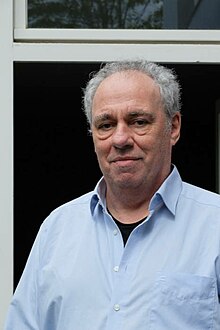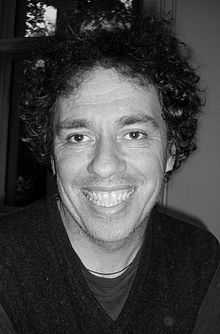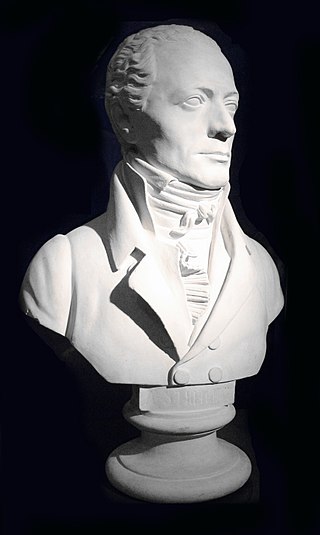
Sidney Corbett (born April 26, 1960, in Chicago, Illinois) is an American composer based in Germany.

Sidney Corbett (born April 26, 1960, in Chicago, Illinois) is an American composer based in Germany.
Sidney Corbett was born in Chicago in 1960, the son of a Jewish mother and a Catholic father, but grew up without a religious upbringing. In 1968, he moved with his family to California, where he played as an electric guitarist in various bands in Los Angeles at the age of fifteen and composed his first works from 1977. [1] [2]
From 1978 to 1982, he studied philosophy and composition at the University of California, San Diego, with Bernard Rands and Pauline Oliveros, among others. In 1985, Corbett continued his composition studies at Yale University, where he taught as a "Teaching Fellow in Composition" and received his doctorate in 1989 with an analysis of the work Hyperprism by the French composer Edgar Varèse. His teachers at Yale University were Jacob Druckman, whose assistant he was, as well as Martin Bresnick, Frederic Rzewski and Morton Subotnick. Corbett was awarded the BMI Student Composer Award in 1985. [3] [4]
From 1985 to 1988, he studied composition with György Ligeti at the Musikhochschule Hamburg and took part in Vladimír Karbusický's doctoral seminar at the University of Hamburg's Institute of Musicology. [3]
Corbett has lived mainly in Europe since 1985, in Hamburg, Stuttgart and Berlin. Since 1991 he has regularly given guest lectures and master classes in Europe and North America. From 1994–1995 he was a visiting professor for composition and analysis of contemporary music at Duke University in Durham (North Carolina). [2]

In 2006, Corbett was appointed Professor of Composition at the Mannheim University of Music and Performing Arts. There he also directs the Forum Neue Musik, which he founded, as well as the concert series of the Gesellschaft für Neue Musik Mannheim (Society for New Music Mannheim). Corbett has lived with his family in Schwetzingen since 2014. [5] [6]
As a guitarist Corbett played from 2004–2008 in the avant-garde techno/house band "Vierte Heimat" and continues to play in various improvising formations to this day. [3] [7]
Corbett has authored articles on musical topics for many years and has also been involved in the programming of various concert series, including the College Music Society Europe (CMSE), Cologne and Musica Nova, Stuttgart. [8]
Corbett was elected to the Akademie der Künste, Berlin in 2022. [9]
Corbett's compositions are published and distributed worldwide by Edition Peters, Leipzig – London – New York. [6] [10]
Releases of his works have appeared on Sony Classical, Cybele, Mode Records, CRI, Edition Zeitklang, Kreuzberg Records, Blue Griffen, Edition Kopernikus and Ambitus Records. [11] [12]
For Corbett, composing is a spiritual act, he concerns himself intensely with spiritual and theological questions and with all forms of mystical experience, including for example also Islamic mysticism. For him, this occupation with the spiritual is a principal source of inspiration; the spiritual is inseparable from the musical. [13] [14]
Corbett often uses holy scriptures as inspiration: he has for example used texts from the Old Testament, for example, Psalm 39 several times, e.g. Psalm 39 for mixed choir (2010), Canticum David for seven voices (2015) and Ein Fremdling, wie alle meine Väter ... for contrabbass clarinet (2010); instrumental variations on prophetic literature such as Three Lamentations [Of the Prophet Micah] for alto saxophone and organ (1998). There are also biblical figures in the operas Noach (2001) and Die Andere (2016). [15]
Corbett uses texts from the Koran, for example in Die Sieben Tore (The Seven Gates) for mezzo-soprano, speaker, flute, harp, piano and percussion (2004) or refers to the Talmud, for example in Bleeding in Babylon for bass clarinet, guitar and double bass (2004). [15]
Corbett has also been inspired by mystical works, including texts by Meister Eckhart for Des Engels Licht for soprano, accordion, harp and string trio (2005) and Vom inneren und äußeren Menschen. Ein Narrenspiel in 13 Inseln for soprano, baritone, speaker/actor and bible shelf (2010) and Mechthild von Magdeburg on Unsér Súnde for five voices (2007). [15]
Corbett's interest in architecture is reflected, for example, in the title of his Symphony No. 1 "Tympan" for large orchestra (1991–1992), where the tympanum, an arched decorative surface above the lintel of the portal of a cathedral, is referred to in the title. The architectural floor plans and proportions of the 11th century cathedral in Mönchengladbach form reference points for the project Die Stimmen der Wände (The Voices of the Walls) for alto flute, saxophone, trombone, electric guitar, violin and violoncello (1993), created with the artist Brigitte Zarm. [16] [17]
Literary influences can be found in his compositions for music theatre, which form a focal point of his work, but also in numerous other works. Examples include numerous vocal works such as Portals for tenor and guitar (1998) based on poems by Walt Whitman, Lieder aus der Bettlerschale for soprano and piano (1998) based on poems by Christine Lavant, Nova angeletta for alto and violin (1996) and for soprano and viola (2000) based on a poem by Francesco Petrarca, Kykloi for soprano and chamber ensemble (2009) based on a text fragment by Barbara Köhler and Rasch for soprano, clarinet, viola, violoncello and piano based on texts by Roland Barthes (2010). [18]
Corbett's instrumental music also bears witness to the composer's literary affinity, e.g. in his Third Symphony: ″Breathing the Water″ (2006), in which texts by Denise Levertov are juxtaposed with the poetry of Amal al-Jubouri. Yaël (2004) reflects Corbett's intensive, decades-long study of the work of Franco-Egyptian poet and philosopher Edmond Jabès. Works influenced by philosophical texts also include Aporia for chamber ensemble (2019), inspired by texts by Jacques Derrida and Utopia and Intimacy (Utopie und Nähe) for solo violin and six voices (2020) based on texts by Ernst Bloch. [19]
Corbett is an artist who cannot be easily placed within the new music mainstream. [19] He is an active guitarist with considerable experience as an improvising musician in various contexts, for example with the avant-garde techno house band "Vierte Heimat", with the ensemble "Letzte Dernière" with two double basses, cello and electric guitar, in which, for example, works by Giacinto Scelsi or Rebecca Saunders were used as the basis for improvisation, and with the Lebanese musician Mazen Kerbaj. [20]
His musical training did not begin with classical music; he only learned to write music at the age of 17 – before that, as a guitarist, he had done everything by ear, i.e. by memorizing or improvising. He has thus remained very open minded towards different forms and styles of musical expression. [21]
During his study of composition in San Diego, at UCSD, from 1978, Corbett was confronted with the most extreme forms of avant-garde music; in 1982 he began his studies at Yale University and became interested for the first time in so-called traditional music - both of which influenced the musical language of his compositions at this time. [22]
His study in Hamburg with György Ligeti from 1985-1988 was a particularly strong influence. At the time, Ligeti criticized Corbett's style as being too avant-garde. Corbett was encouraged to look at his own compositions more critically and, above all, more closely. [22]
Corbett developed his own independent musical language, one primarily characterized by strictly linear and vocally oriented melodic writing. The melodic lines are often shifted against each other at half or whole tone intervals, leading to a dissonance-rich and tonally ambiguous harmony. His music is characterized by complex, superimposed rhythmic pulsations; metrical focal points are negated, giving Corbett's music a flowing character that oscillates in large phrases while still retaining formal unity. By incorporating extended playing techniques and the often unconventional combination of instruments, a rich spectrum of timbral colors is achieved. [8] [19]
A particular focus of Corbett's work lies in the field of music theater. [6]
Gaudeamus Amsterdam (1988), Biennale Zagreb (1989), New Orchestra Project – New York (1989), Steirischer Herbst (1989), [35] Eclat Stuttgart (2002), [36] Performing Arts Chicago (1995), Duke Summer Arts Festival (1996), Tacheles Berlin 2004, [28] Tonhalle Düsseldorf 2006, [28] Klangwerkstatt Berlin (2006, 2018, 2021), [37] Klangwerktage Hamburg (2007, 2012), [38] [39] Wien Modern (2009), [40] Bregenzer Festspiele (2020, 2021), [41] [42] SinusTon-Festival für elektroakustische Musik (2014), [43] Nordic Piccolo Festival (2023), [44] Baltic Music Days Riga (2023) [45] et al.
{{cite book}}: CS1 maint: location missing publisher (link){{cite book}}: CS1 maint: location missing publisher (link){{cite book}}: CS1 maint: location missing publisher (link){{cite book}}: CS1 maint: location missing publisher (link){{cite book}}: CS1 maint: location missing publisher (link){{cite book}}: CS1 maint: location missing publisher (link)
Stefan Wolpe was a German-born American composer. He was associated with interdisciplinary modernism, with affiliations ranging from the Bauhaus, Berlin agitprop theater and the kibbutz movement to the Eighth Street Artists' Club, Black Mountain College, and the Darmstadt Summer Courses for New Music. He lived and worked in Berlin (1902–1933) until the Nazi seizure of power forced him to move first to Vienna (1933–34) and Jerusalem (1934–38) before settling in New York City (1938–72). In works such as Battle Piece (1942/1947) and "In a State of Flight" in Enactments for Three Pianos (1953), he responded self-consciously to the circumstances of his uprooted life, a theme he also explored extensively in voluminous diaries, correspondence, and lectures. His densely eclectic music absorbed ideas and idioms from diverse artistic milieus, including post-tonality, bebop, and Arab classical musics.

Gustaf Allan Pettersson was a Swedish composer and violist. He is considered one of the 20th century's most important Swedish composers and was described as one of the last great symphonists, often compared to Gustav Mahler. His music can hardly be confused with other 20th-century works. In the final decade of his life, his symphonies developed an international following, particularly in Germany and Sweden. Of these, his best known work is Symphony No. 7. His music later found success in the United States. The conductors Antal Doráti and Sergiu Comissiona premiered and recorded several of his symphonies. Pettersson's song cycle Barefoot Songs influenced many of his compositions. Doráti arranged eight of the Barefoot Songs. Birgit Cullberg produced three ballets based on Pettersson's music.

Aribert Reimann was a German composer, pianist, and accompanist, known especially for his literary operas. His version of Shakespeare's King Lear, the opera Lear, was written at the suggestion of Dietrich Fischer-Dieskau, who performed the title role. His opera Medea after Grillparzer's play premiered in 2010 at the Vienna State Opera. He was a professor of contemporary Lied in Hamburg and Berlin. In 2011, he was awarded the Ernst von Siemens Music Prize for his life's work.

Venus und Adonis is a one-act opera by Hans Werner Henze with a German libretto by Hans-Ulrich Treichel, after the poem by William Shakespeare. The work uses singers and dancers.
Junsang Bahk is a celebrated Korean composer, also active in Austria.

Johann Andreas Streicher was a German pianist, composer and piano maker. In 1793, he married Nannette Streicher (1769–1833), another piano maker and daughter of Augsburg piano maker Johann Andreas Stein. In 1794, they moved to Vienna. From that time, Streicher worked as a piano teacher and became increasingly known for his compositions. The Streicher piano-making business provided at least one fortepiano to Beethoven in his early years, of which the composer was fond, writing that it was "too good for me ... because it robs me of the freedom to produce my own tone".
Allan Pettersson wrote his Symphony No. 9 in 1970.

Jörg Widmann is a German composer, conductor and clarinetist. In 2023, Widmann was the third most performed living contemporary composer in the world. Formerly a clarinet and composition professor at the University of Music Freiburg, he is composition professor at the Barenboim–Said Akademie. His most important compositions are the concert overture Con brio, the opera Babylon, an oratorio Arche, Viola Concerto, Kantate and the trumpet concerto Towards Paradise. Widmann has written musical tributes to Classical and Romantic composers. He was awarded the Bavarian Maximilian Order for Science and Art in 2018 and the Bach Prize of the Free and Hanseatic City of Hamburg in 2023. He was Gewandhaus Composer of the Gewandhaus Orchester Leipzig and Composer in Residence for the Berlin Philharmonic.

Eva Rieger is a German musicologist. Rieger specialized in the social and cultural history of women in music. Together with the German-Swiss patron Mariann Steegmann, Rieger founded the Mariann-Steegmann-Foundation, which is dedicated to the advancement of women in music and the arts. In 2012, she was appointed Honorary Senator of the Hochschule für Musik und Theater Hamburg.
Musik-Konzepte is a quarterly series of German language musicology texts founded in 1977 by Heinz-Klaus Metzger and Rainer Riehn and dedicated to the avant-garde in music of all epochs. Since 2004 it has been edited by Ulrich Tadday.
Dietrich Kämper is a German musicologist.
Christoph von Blumröder is a German musicologist.
Grete Hinterhofer was an Austrian pianist, music teacher and composer.
Wolfgang Martin Stroh is a German musicologist and Emeritus professor at the Carl von Ossietzky Universität Oldenburg.
Günter Mayer was a German cultural academic and musicologist.
Gerd Rienäcker was a German musicologist.
Sigrid Neef is a German musicologist and theatre scholar, focused on Russian and Soviet opera. She has been a dramaturge of the director Ruth Berghaus at the Deutsche Staatsoper Berlin for decades.

Fritz Jöde was a German music educator and one of the leading figures in the Jugendmusikbewegung.
Ulrich Drüner is a German musicologist and orchestra musician.
Volker Straebel is a German musicologist and composer and performer of experimental music.